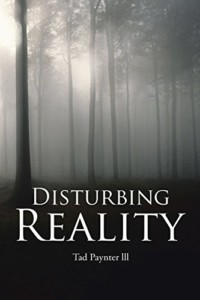Title: Disturbing Reality
Author: Ted Paynter III
Publisher: XlibrisUS
ISBN: 978-1-5434-6033-9
Pages: 142
Genre: Poetry
Reviewed by: Susan Brown
Pacific Book Review
The art of poetry tackles, in a much different manner then writing prose, a writer’s ability to capture an idea that is intriguing, significant, gripping, frightening or hopeful, plus a host of other feelings, with incisive writing that pares away the nonessential. Poetry should evoke strong emotions, have an enduring message and use image-building language to help a reader see the world from a different perspective. In this collection of 41 poems, Mr. Paynter, author and poet, does all of this. His poetry reflects his unique outlook on the dark side of some of life’s gloomiest issues such as death, grief, sadness, greed, addiction and revenge. There is, refreshingly, also a smattering of joy, love, courage throughout this book, a call to reflect with an open mind on our place in the interconnected world we inhabit.
Many of the poems in Disturbing Reality are, indeed, disturbing. They’re snapshots that highlight issues that make us uncomfortable; an emotion Paynter is good at eliciting. He takes us into the recesses of a troubled mind in Asylum, “Am I insane? I ask myself. The voices, the demons just have one message; they keep trying to convince me that I am already dead.” The suicide of a troubled soul of is captured in Oceans at Dawn, “When you come to the ocean, try to smile, know in your heart that I have walked my mile, my torment is over, so please go on but remember me when you see an ocean dawn.” The terror of domestic abuse, “She went home with jaws wired shut and hate in her eye,” is underscored in Enough is Enough and Never More. But this poet’s world is neither all grim nor hopeless. Tributes to those in the Armed Services are reflected in A Letter Home, a sweet, touching tribute to US Marines who serve in war zones far from home, and in A Tribute, a heartfelt thank you to veterans and their families.
The realism of these poems, disturbing or not, is tangible. Each has its own rhythm and rhyming pattern that creates a mood, one in which a conflict reaches a resolution that sparks a reaction. Payntner’s writing is expressive and bold, carrying the reader along from the first stanza with powerful phrasing and vivid imagery. It challenges us to, in the author’s own words, “take lessons and inspiration from the contents.” This is a thought-provoking collection of poems which grabs a snippet of those areas of life in which many of us don’t want to delve too deeply. They may cause some discomfort, but out of that discomfort comes awareness and that is what makes this anthology a success.


